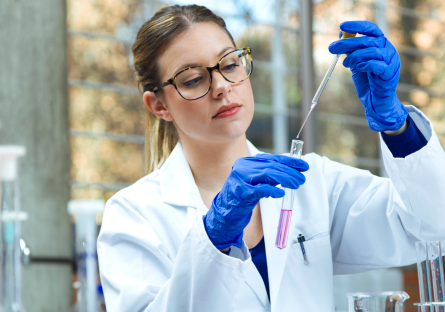This article appears for archival purposes. Any events, programs and/or initiatives mentioned may no longer be applicable.

The Maricopa County Community College District (MCCCD) is proud to announce that as part of the Medical Device Manufacturing Multiplier Strategy Development Consortium (MDM2), the group has been awarded a federal grant to further its strategic work.
As part of the U.S. Department of Commerce’s Economic Development Administration (EDA) Tech Hubs programs, MDM2 has received a planning grant supporting the group’s collaboration and investment model designed to further position Greater Phoenix with the rapidly evolving healthcare innovation economy. MDM2 was one of twenty-nine Strategic Development Grant (SDG) recipients across the United States and the only group in Arizona to receive an award during the first phase of the program.
“We are excited to be part of the MDM2 consortium, bringing our expertise and knowledge in workforce development within healthcare, artificial intelligence and machine learning, and biomedical fields,” said District Director of Healthcare Education, Rochelle Rivas. “Through our existing programs at our colleges, we are collaborating with incumbent medical device companies to train and equip the workforce for medical device manufacturing.”
The MDM2 consortium is focused on increasing medical device manufacturing in the region and increasing the sector’s domestic competitiveness. Participation in the MDM2 allows MCCCD to foster collaboration between education, industry, and community partners.
“The work of the MDM2 consortium will accelerate Greater Phoenix’s impact as a competitive bioscience hub while creating a healthier, more equitable future for our communities,” said Chris Camacho, President and CEO of Greater Phoenix Economic Council. “A skilled workforce is integral to this mission, and we’re proud to have MCCCD as a key partner in ensuring the strategy buildout is supported by specialized talent.”
The MDM2 consortium comprises twenty-five organizations spanning higher education, industry workforce training, venture development, philanthropy, and government, supported by U.S. Senators Mark Kelly and Kyrsten Sinema. The SDG funding, part of which will be matched by the Flinn Foundation, Virginia G. Piper Charitable Trust, and the Vitalyst Health Foundation, will enable the MDM2 to accelerate equitable regional economic growth in the manufacturing of medical devices driven by emerging technologies, such as artificial intelligence (AI) and machine learning. This has the potential to transform healthcare access and equity while generating wide-range impacts on the national and economic security of the nation.
About the Medical Device Manufacturing Multiplier Strategy Development Consortium
The Medical Device Manufacturing Multiplier Strategy Development Consortium (MDM2) aims to accelerate equitable regional economic growth by leveraging existing assets for the manufacturing of smart and digital medical devices driven by emerging technologies, such as AI and machine learning. The consortium seeks to transform healthcare access and equity and enhance national economic security and competitiveness by increasing the U.S. capacity for advanced manufacturing and building more resilient supply chains. MDM2 addresses vulnerabilities highlighted by the COVID-19 pandemic, fostering a collaborative public-private model to develop a skilled workforce and position Phoenix as a global leader in medical device manufacturing.
The consortium includes twenty-five members across various industry sectors, including Higher Education (Arizona State University, Grand Canyon University, Northern Arizona University, Phoenix Bioscience Core, University of Arizona – Phoenix); Government (City of Chandler, City of Phoenix, Maricopa County); Industry (Arizona Bioindustry Association Inc., Barrow Neurological Institute, BD Peripheral Intervention, HonorHealth, Intel Corporation, Medtronic, W.L. Gore & Associates); Economic Development (Greater Phoenix Economic Council, Partnership for Economic Innovation); Workforce Training (Maricopa County Community College District); Venture Development (IdealabX, Opportunity Through Entrepreneurship Foundation, Yoo and Company Accelerators); Community Development (Local Initiatives Support Corporation – Phoenix, Healthy Communities) and Philanthropy (Flinn Foundation, Virginia G. Piper Charitable Trust, Vitalyst Health Foundation). The consortium is also supported by Sens. Mark Kelly and Kyrsten Sinema.